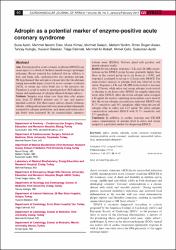Adropin as a potential marker of enzyme-positive acute coronary syndrome

Göster/
Tarih
2017Yazar
Aydın, SunaEren, Mehmet Nesimi
Yılmaz, Musa
Kalayci, Mehmet
Yardım, Meltem
Alataş, Ömer Doğan
Aydın, Suleyman
Üst veri
Tüm öğe kaydını gösterÖzet
Aim: Enzyme-positive acute coronary syndrome (EPACS) can cause injury to or death of the heart muscle owing to prolonged ischaemia. Recent research has indicated that in addition to liver and brain cells, cardiomyocytes also produce adropin. We hypothesised that adropin is released into the bloodstream during myocardial injury caused by acute coronary syndrome (ACS), so serum and saliva levels rise as the myocytes die. Therefore, it could be useful to investigate how ACS affects the timing and significance of adropin release in human subjects. Methods: Samples were taken over three days after admission, from 22 EPACS patients and 24 age-and gendermatched controls. The three major salivary glands (submandibular, sublingual and parotid) were immunohistochemically screened for adropin production, and serum and saliva adropin levels were measured by an enzyme-linked immuno-sorbent wassay (ELISA). Salivary gland cells produce and secrete adropin locally. Results: Serum adropin, troponin I, CK and CK-MB concentrations in the EPACS group became gradually higher than those in the control group up to six hours (p < 0.05), and troponin I continued to rise up to 12 hours after EPACS. The same relative increase in adropin level was observed in the saliva. Troponin I, CK and CK-MB levels started to decrease after 12 hours, while saliva and serum adropin levels started to decrease at six hours after EPACS. In samples taken four hours after EPACS, when the serum adropin value averaged 4.43 ng/ml, the receiver operating characteristic curve showed that the serum adropin concentration indicated EPACS with 91.7% sensitivity and 50% specificity, while when the cut-off adropin value in saliva was 4.12 ng/ml, the saliva adropin concentration indicated EPACS with 91.7% sensitivity and 57% specificity. Conclusion: In addition to cardiac troponin and CK-MB assays, measurement of adropin level in saliva and serum samples is a potential marker for diagnosing EPACS.

















